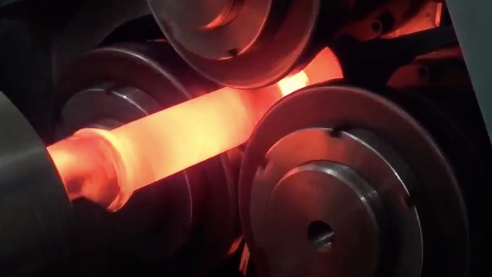A contemporary forge looks more like a modern laboratory than a blacksmith shop. The elements manufactured there, which often are very technologically advanced, are used in the production of everyday objects, including cars, agricultural machinery, and airplanes.
However, in times of rising energy prices and stringent environmental regulations, the issue of energy waste and high emission levels is becoming increasingly important. To meet the growing demands of the market, the forging industry is seeking solutions to respond to the challenges of a sustainable and knowledge-based economy.
Many companies team up with universities to find solutions that enable minimization of costs, enhanced efficiency, and superior characteristics. An example is cooperation between Lublin University of Technology and an American company, Parker Hannifin, and their innovative solution for the Polish forging industry.
Between the scientific research community and industry
Parker Hannifin has a solid understanding of the importance of cooperation between the scientific research community and industry. As a global leader in motion and control technologies with over a century of history, it designs engineering solutions to support a wide range of markets – from industry through aerospace, medicine, sports and entertainment. The company’s solutions have contributed to advances in production processes, military and medical technologies, and space exploration. They are part of almost every man-made device that uses motion.
For many years, Parker Hannifin has cooperated with universities around the world, from California to Shanghai, donating equipment, providing internships and scholarships, and creating joint research units. Now its experience and knowledge will also be used in Poland.
Science for forging
The Department of Computer Modelling and Metal Forming Technologies at the Faculty of Mechanical Engineering of the Lublin University of Technology has established cooperation with Parker Hannifin on the numerically controlled skew rolling mill project. The device enables quick and precise forming of individual metal parts of various sizes.
A team of six under the leadership of Prof. Zbigniew Pater has built a rolling station that is unique on a national scale. The station enables manufacturing of large-size forging preforms and drawn forgings such as stepped axles and shafts. Elements forged in this way are then used in mechanical engineering; they are also used to make tools and everyday objects. It is impossible to imagine a modern airplane, car, or tractor without forged parts. In fact, they constitute about 30% of the weight of the entire structure, and often more.
In addition to providing appropriate components, experts from Parker Hannifin helped the researchers to apply precision electric actuators in the rolling mill they were designing.
Four servo-driven ETH electric actuators were applied. Their motion trajectory is modeled on the basis of a CAD file converted to G-code, which enables synchronous setting of Run commands in real time to each actuator through the EtherCAT network. The functionality of this solution is provided by a motion controller from Parker Hannifin.
Use of modern Parker Hannifin elements and applications means that the solution created by the scientists from Lublin is characterised by shorter time of shaping the product in comparison to free forging and minimisation of material losses during finishing thanks to increased precision of the detail fabrication.
“Our company has cooperated with scientific institutions around the world for many years, so we are glad to have the opportunity to do so in Poland too. Combining our actuators with the knowledge of researchers from the Lublin University of Technology has resulted in a solution that meets the real needs of the market”, said Vladimira Fadrna, Marketing Communications Leader for Central and Eastern Europe at Parker Hannifin. “We develop numerous innovative solutions for industry and we are glad that they help to create further technologies to be used in forging in Poland”, she added.
Another unquestionable advantage of the skew rolling process is that it enables piece production. So the costs of preparing dedicated prototype tools for specific processes are eliminated.
Forging for science
“The constructed demo station serves science as well. Its creation has made it possible to carry out the necessary research and use it in teaching activities, mainly for the needs of engineering and master’s theses”, emphasized Konrad Lis, M.Sc. from the Department of Computer Modelling and Metal Forming Technologies at the University of Technology in Lublin.
Although the finished device has already been installed in a university building, the research project has not yet come to an end, since the researchers are constantly working to increase the accuracy with which the rolling mill forms details.
The main area of scientific activity of the Department of Computer Modelling and Metal Forming Technologies includes metal working, technologies of skew and cross rolling processes, and steel die forging. This is where new solutions are invented to enable further development of forges in Poland.
